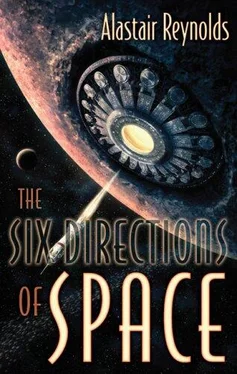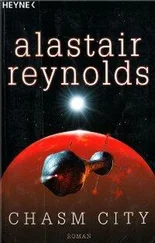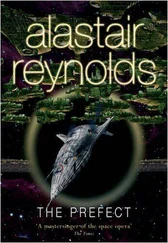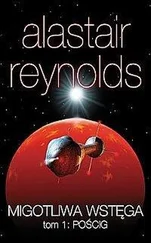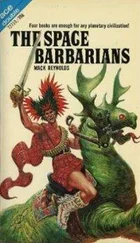* * *
I came around in my cabin, gripped by a vile nausea, a headache like a slowly closing iron vice, and no conception of how much time had passed since Tayang and I had been disturbed in the library. Getting out of bed—I had been placed on top of the sheets—I searched the adjoining annex for the eunuch, before I remembered that he was still in the sick bay. I tried my door and found that it had been locked from the outside; there was no way for me to leave my room.
Understand, I did not accept my imprisonment lightly, but understand also that all my attempts at escape proved futile. I could not even squeeze through the conduit I had mentioned to the eunuch: such methods succeed in adventure stories, but not in real life.
Of course, it was desired that I be kept alive. The man who had shot me could have administered a fatal dose simply by twisting a dial in the grip of his weapon. He had chosen not to, and it was no accident that food and water appeared in the room’s serving hatch at regular intervals. But as to who had chosen to detain me, I was uninformed.
I could guess, though.
He was the first to see me when the ship docked in Kuchlug space. He came to my room, accompanied by guards. He was as squat and muscled as a wrestler, his bare arms fully as thick as my thighs. He wore a leather jerkin, crisscrossed by thick black belts to which were fastened various ceremonial weapons and symbols of martial authority. A carefully tended mustache curled down on either side of his mouth, with a tiny but deliberate tuft of hair preserved under his lower lip. A stiff leather helmet, long at the sides and back, covered the rest of his head. The only visible part of his hair was a blunt, wedge-shaped fringe terminating just above his eyebrows, which were at once finely drawn, expressive, and deeply quizzical.
Of course, I knew the face.
“Commander Qilian,” I said.
“Yes, I get about.” His hands were impressively hairy, scarred and knotted like the roots of a very old tree. He snapped his fingers at the guards. “Have her brought to the debriefing facility on the Qing Shui moon. Bring the pony as well.” Then he poked one of those fingers under my chin, lifting it up so that our eyes met. “Give some thought to the particulars of your story, Miss Bocheng. It may make all the difference.”
* * *
They took me down to the moon. We landed somewhere and I was carried through dark, rusting corridors to a windowless holding cell. The floor rocked with a slow, sickening motion, as if I was on a ship at sea in a high swell—even though there were no oceans on the Qing Shui moon. They stripped me, took away my belongings, and gave me prison clothing to wear: a simple one-piece affair in orange silk. I pretended to be shocked and disoriented, but I was already summoning my training, recollecting those stratagems I had been taught to withstand prolonged detention and interrogation. As the guards were shutting the door on me, I contrived to slip a finger into the crack between the door and its frame. When the door closed, I yelped in pain and withdrew my hand with the fingertip squashed and red from the pressure.
I sucked it in my mouth until the pain abated.
“Stupid bitch,” someone said.
There was a bunk, a spigot in the wall that dribbled tepid, piss-colored water, and a hole in the floor, with chipped ceramic sides stained an unspeakable brown. Light seeped in through a grille in the door.
Neither willing nor able to sleep, I lay on the bunk and shivered. Presently—no more than two or three hours after my arrival—men came to take me down the corridor, to an interrogation room.
It is not necessary to document all that happened—the many weeks that it took for me to permit them to peel back the layers of identity I had wrapped around myself, each time thinking that the victory was theirs.
Suffice it to say that most of what they did to me involved electricity and chemicals in varying combinations. They did break two fingers on my left hand, including the one I had trapped in the door, but when they pulled out one of my fingernails, it was from the other hand, not the one I had hurt. They beat me around, broke my teeth, extinguished Yesugei brand cigarettes on my skin, but only cut me superficially, to demonstrate that they could and would. Then they had other men come in to sterilize and dress the wounds. Once in a while, a gowned doctor with a Slavic face came to the cell and gave me a thorough, probing medical examination.
It was during one of the doctor’s examinations that I elected to reveal myself as a government spy. As the doctor was examining me, I allowed my hair—stiff and greasy with dirt—to fall away from the nape of my neck. I knew instantly that he had taken the bait. I felt his fingers press into the area around the subcutaneous device, feeling for the hard-edged component lodged under the skin.
“What is this?”
“What is what?” I asked, all innocence.
“There’s something under your skin.”
They took me back to the interrogation room. My hair was shaved and my neck swabbed. The Slavic doctor dithered over the medical tools on the shelves until he found the bundle he wanted. He brought the instruments onto the table, unrolling the towel so that I could see what lay in store for me. When he was done, the implant was placed on a piece of clean towel in front of me. It was bloodied, with bits of whitish flesh still attached to its feelerlike input probes.
“Looks like government,” someone said.
I did not admit to it immediately; that would have made them rightfully suspicious. It was a matter of judging the moment, making my confession appear natural, rather than a scripted event.
In hindsight, I wish that I had arranged my confession sooner.
I was brought to a different room. There was a window in the wall, before which I was encouraged to sit.
A clamp was fitted around my eyes so that I could not look away. The doctor dripped some agent into my eyes that had the effect of paralyzing the lids, preventing me from blinking. When the lights came on in the room on the other side of the window, I found myself looking at Goyo.
He was upside down, suspended in a sling, rotated on his back in the manner that horses are prepared for veterinary work. The sling was supported from a heavy white framework mounted on trolley wheels.
Goyo’s legs had been bound together in pairs using thick adhesive material. Even his head and neck had been braced into position using cushioned supports and clamps. A leathery girth strap enclosed his waist, preventing him from thrashing around. His abdominal region, between fore and hind limbs, had been shaved to the skin. A white sheet, not much larger than a towel, had been draped over part of that shaven area. There was a red stain in the middle of the sheet, where it formed a depression.
Goyo’s eye, the one that I could see, was white and wild and brimming with fear.
Qilian walked into the room. He was dressed as I remembered him from our encounter on the BK, except that his hands and forearms were now gloved. The gloves had a heavy, martial look to them, with curved steel talons on the ends of the fingers. He stopped next to Goyo, one hand resting on the frame, the other stroking my pony’s neck, as if he sought to placate him. When he spoke, his voice came through a microphone.
“We think we know who you are, but some corroboration would be welcome. What is your operational code name? To which section are you assigned? Are you one of the Thirteen?”
My mouth had turned dry. I said nothing.
“Very well,” Qilian continued, as if he had expected as much. He reached over and whisked the white sheet away from Goyo’s abdomen. There was a wound there, a red sucking hole wide enough to plunge a fist through.
Читать дальше
